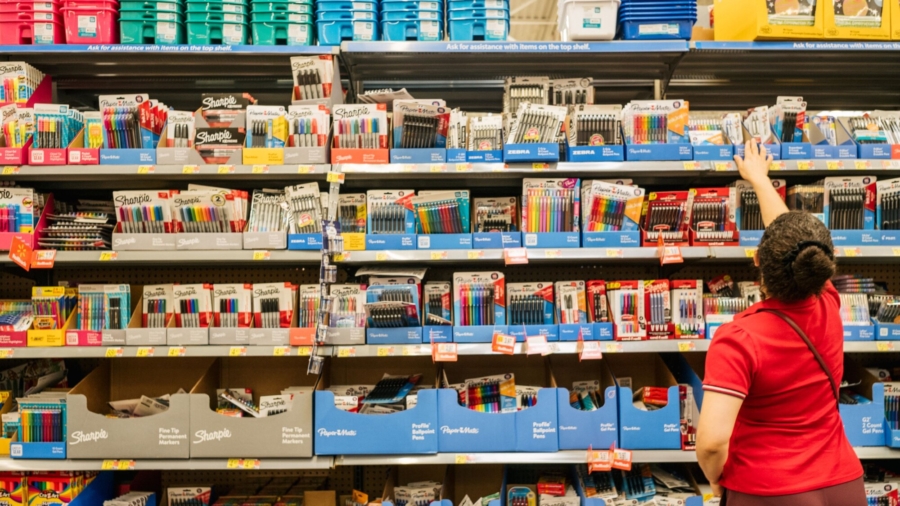U.S. consumer confidence fell in August to its lowest level in six months, driven by concerns about the spread of the Delta variant of the CCP (Chinese Communist Party) virus and surging prices.
The Conference Board said in an Aug. 31 report that its consumer confidence index fell from a reading of 125.1 in July to 113.8 in August.
“Consumer confidence retreated in August to its lowest level since February 2021 (95.2),” Lynn Franco, Senior Director of Economic Indicators at The Conference Board, in a statement. “Concerns about the Delta variant—and, to a lesser degree, rising gas and food prices—resulted in a less favorable view of current economic conditions and short-term growth prospects.”
Two other gauges, one assessing current economic conditions and the other reflecting consumers’ future outlook over the short-term, also declined.
The present situation index, which measures consumers’ assessment of current business and jobs market conditions, fell from 157.2 in July to 147.3 in August. Broken down into their respective components, 19.9 percent of consumers said current business conditions were “good” in August, down from 24.6 percent in the prior month. At the same time, 24.0 percent said conditions were “bad,” up from 20.0 percent in July.
Consumers’ assessment of current labor market conditions remained largely unchanged over the month, with 54.6 percent saying jobs were “plentiful” in August compared to 55.2 percent expressing the same view in July. At the same time, 11.8 percent of consumers said jobs were “hard to get” in August, a slight drop from 11.1 percent in July.
The drop in consumers’ assessment of current labor market conditions comes despite businesses reporting difficulty hiring workers and as the number of job openings in the United States has surged to a record high. The Labor Department’s Job Openings and Labor Turnover Survey (JOLTS), released Aug. 9, showed that the number of job vacancies jumped by 590,000 to 10.1 million on the last day of June, led by gains in professional and business services, retail trade, and accommodation and food services.
“This is by far the record amount of job openings the economy has ever had. This historically elevated level makes clear that we have a severe worker shortage that threatens what should be a prolonged economic boom,” Curtis Dubay, senior economist at the U.S. Chamber of Commerce, said in a note.
At the same time, the JOLTS report showed that employers hired 6.7 million workers in June, with some economists saying the mismatch between vacancies and hiring is problematic.
“The biggest problem is getting workers to fill the historically large amount of open jobs,” Dubay wrote. “The enormous number of job openings is holding the economy back from reaching its potential.”
Future Outlook
The Conference Board’s expectations index, which is based on a short-term outlook for income, business, and labor market conditions, fell from 103.8 in July to 91.4 in August. As was the case with the present conditions index, the six months hence gauge saw the biggest decline in the area of business conditions, while both the labor market outlook and that of consumers’ financial prospects ticked down by smaller amounts.
In August, 22.9 percent of consumers expected business conditions would improve in six months, down from 30.9 percent in July. Short-term labor market optimism in August fell to 23 percent, down from 25.5 percent in July. Nearly 18 percent of consumers said in August they expect their incomes to increase over the short term, down from 20 percent in July.
“While the resurgence of COVID-19 and inflation concerns have dampened confidence, it is too soon to conclude this decline will result in consumers significantly curtailing their spending in the months ahead,” Franco said in a statement.
Consumer spending is a key driver of the U.S. economy, accounting for around two-thirds of economic output.
Recent Commerce Department data showed consumer spending in July grew by a tepid 0.3 percent, a far slower pace than the 1.1 percent pace of growth in the prior month and a sign that the economic recovery may be losing steam in the third quarter.
Still, the foundation for the economic recovery appears relatively solid, with the Commerce Department report showing wages rising and a boost in savings, giving American consumers more spending potential to unlock going forward, even as the rise in infections clouds the outlook.
A separate sentiment gauge published last week echoed the Conference Board’s findings, also citing the Delta variant and inflation as factors. The University of Michigan’s consumer sentiment index fell to 70.3 in August, the lowest level since 2011.
“Consumers’ extreme reactions were due to the surging Delta variant, higher inflation, slower wage growth, and smaller declines in unemployment,” Richard Curtin, the survey director, said in a statement. “The extraordinary falloff in sentiment also reflects an emotional response, from dashed hopes that the pandemic would soon end and lives could return to normal.”
While the spread of the Delta variant has led economists to trim their forecasts for growth in the current quarter, analysts still believe if COVID-19 cases fall in the final months of 2021, the country will experience its strongest growth this year in decades.
From The Epoch Times


